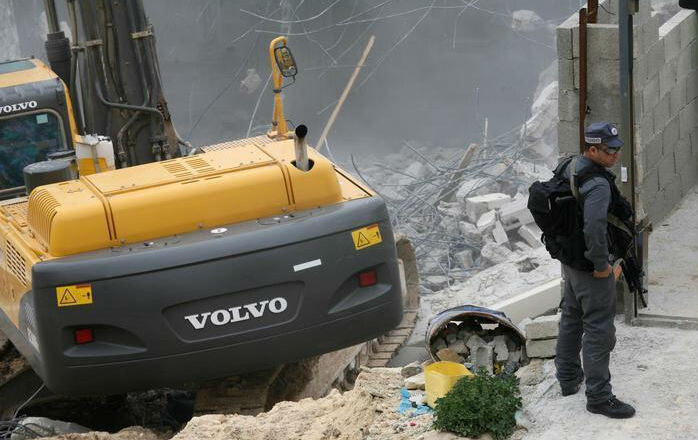The Electronic Intifada Ramallah 20 August 2011

The Israeli army has increased the number of demolitions of Palestinian homes in the West Bank.
ActiveStillsRAMALLAH (IRIN) - Each year, hundreds of Palestinians in the West Bank have their homes demolished by the Israeli authorities because they are unable to obtain permits for their buildings, according to the UN Office for the Coordination of Humanitarian Affairs (OCHA). The demolitions take place in Area C, a zone designated by the Oslo accords covering 60 percent of the West Bank with a Palestinian population of about 150,000.
Israel retains military authority and full control over building and planning in Area C: as much as 70 percent of it is inaccessible to Palestinians, classified as Israeli settlements, firing zones or nature reserves.
In the remaining 30 percent there are a number of other restrictions that reduce the possibility for Palestinians to obtain a building permit, reports OCHA. In practice, Palestinian construction is normally permitted only within the boundaries of a plan approved by the Israeli Civil Administration, which covers less than 1 percent of Area C, much of which is already built-up, according to OCHA.
Many Palestinians living in Area C are left with no choice other than to build without a permit.
Israel says authorities have only demolished illegal structures, and that Jewish and Palestinian residents in Area C are subject to the same restrictions.
An August 2011 OCHA report highlights the concerns of 13 Area C communities, including restrictive and discriminatory planning and zoning policies which limit Palestinian construction and use of the land, and lack of effective law enforcement in response to settler attacks.
Also, movement and access restrictions, like those created by Israel’s wall in the West Bank, limit access to land and water resources for many communities.
Racist grafitti
Residents of Khallet Zakariya, located in Area C south of Bethlehem say Israeli authorities are demolishing their homes and settlers have destroyed their livelihoods in an effort to force the community to relocate.
Farmer Mohamed Khalil, 55, from Khallet Zakariya, says Israeli settlers ruined about half a hectare of his agricultural fields in June and spray-painted “death to Arabs” in black on the wall of his home, which is still visible.
“It’s not the first time settlers destroyed my land,” said Khalil. “It takes 3-4 years to cultivate crops of grapes and plums.”
The lost crops will affect income for three families, including 19 people. Mohamed has filed a complaint with Israeli police.
According to Khalil, officials from the Civil Administration, the Israeli governing body that operates in the West Bank, came and offered to relocate his community of about 350 people to an area west of Bethlehem called Nahhlin.
“My father cultivated this land — we declined,” he said.
With the Bat Ayin settlement located directly west and the Rosh Zurim settlement directly to the north, residents of Khallet Zakariya say there is a strategy to force them out to allow further settlement expansion.
However, expansion has mostly been in larger settlements over the past year, according to Israeli human rights organization B’Tselem.
20 minutes notice before bulldozing
Fatima Saed, her husband Mahmoud, and their four children had 20 minutes notice to pack their belongings and evacuate their home in Khallet Zakariya before it was bulldozed by Israeli authorities on 25 July.
“Our lawyer was not informed that we had lost our court case disputing the demolition order for our home,” said Fatima. Her family is now living at her brother’s house nearby, with 21 people crammed into two rooms.
“We built here without a permit, because my family owns the land,” she said.
In the first six months of 2011, OCHA reports that the Israeli authorities demolished 342 Palestinian-owned structures in Area C, including 125 residential “structures,” displacing a total of 656 Palestinians, including 351 children — almost five times as many demolitions and people displaced as during the first half of 2010.
Guy Inbar, the Israeli coordinator of government activities in the occupied Palestinian territory (COGAT), said: “There is no policy to move people from their homes.”
He acknowledged, however, that Israel has increased action to monitor unapproved building, both in Jewish and Palestinian sectors within Area C. Under international law, all Israeli settlements in the West Bank (including East Jerusalem) are illegal. But Israel has created confusion by referring to settlement expansions not officially authorized by its governments as “illegal outposts.”
“A similar number of illegal Israeli and Palestinian structures have been demolished by Israel so far in 2011,” said Inbar, and “Israel is working to approve and authorize more areas within Area C that Palestinians will be permitted to live [in] and build [on].”
Few building permits
B’Tselem spokesperson Sarit Michaeli said: “Israeli settlements were built in contravention of international law in the West Bank, while the Palestinian population in Area C is under occupation and protected by international law.”
Another Israeli organization, Bimkom, comprised of planners and architects to strengthen human rights in the field of planning, published a comprehensive report in 2008 detailing what it describes as separate planning systems for Israeli settlements that allow for growth and expansion.
From 2000 to 2007, the Civil Administration approved 5 percent of the applications for building permits submitted by Palestinians in Area C. The total number of building permits issued to Palestinians during these seven years was 91, an average of 13 building permits per annum, Bimkom reported.
This item comes to you via IRIN, a UN humanitarian news and information service, but may not necessarily reflect the views of the United Nations or its agencies. All IRIN material may be reposted or reprinted free-of-charge; refer to the copyright page for conditions of use. IRIN is a project of the UN Office for the Coordination of Humanitarian Affairs.


